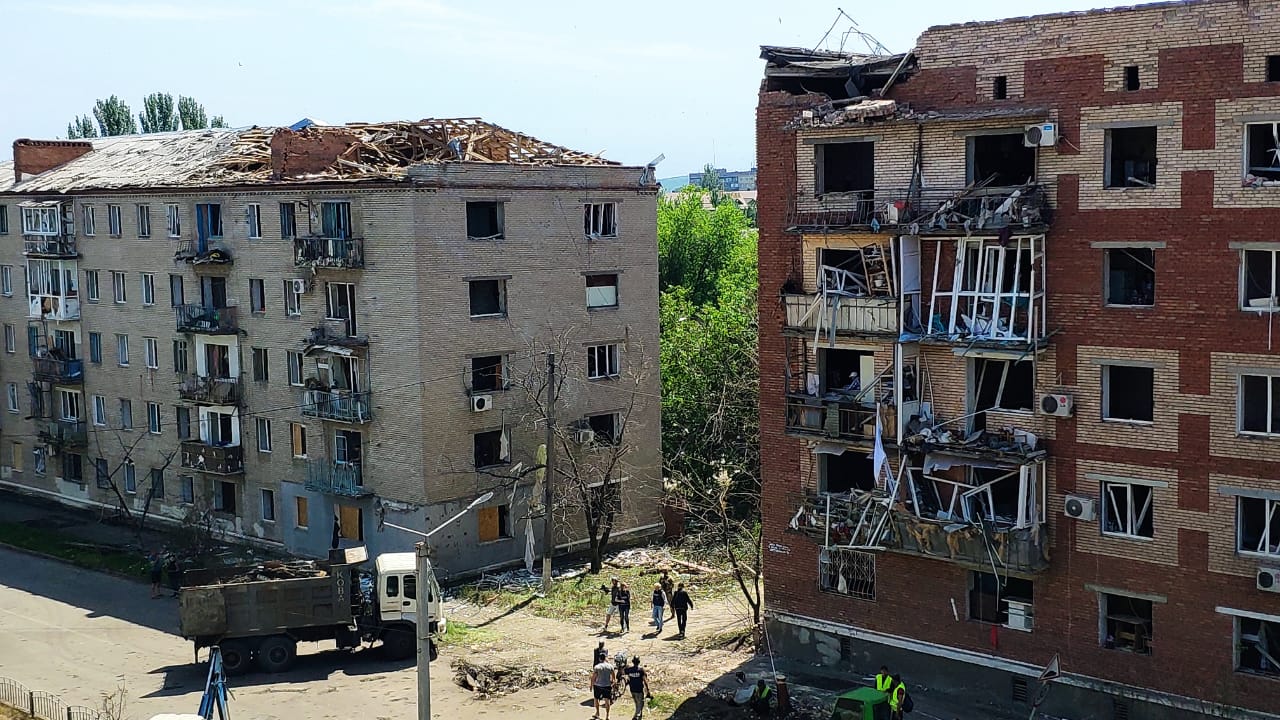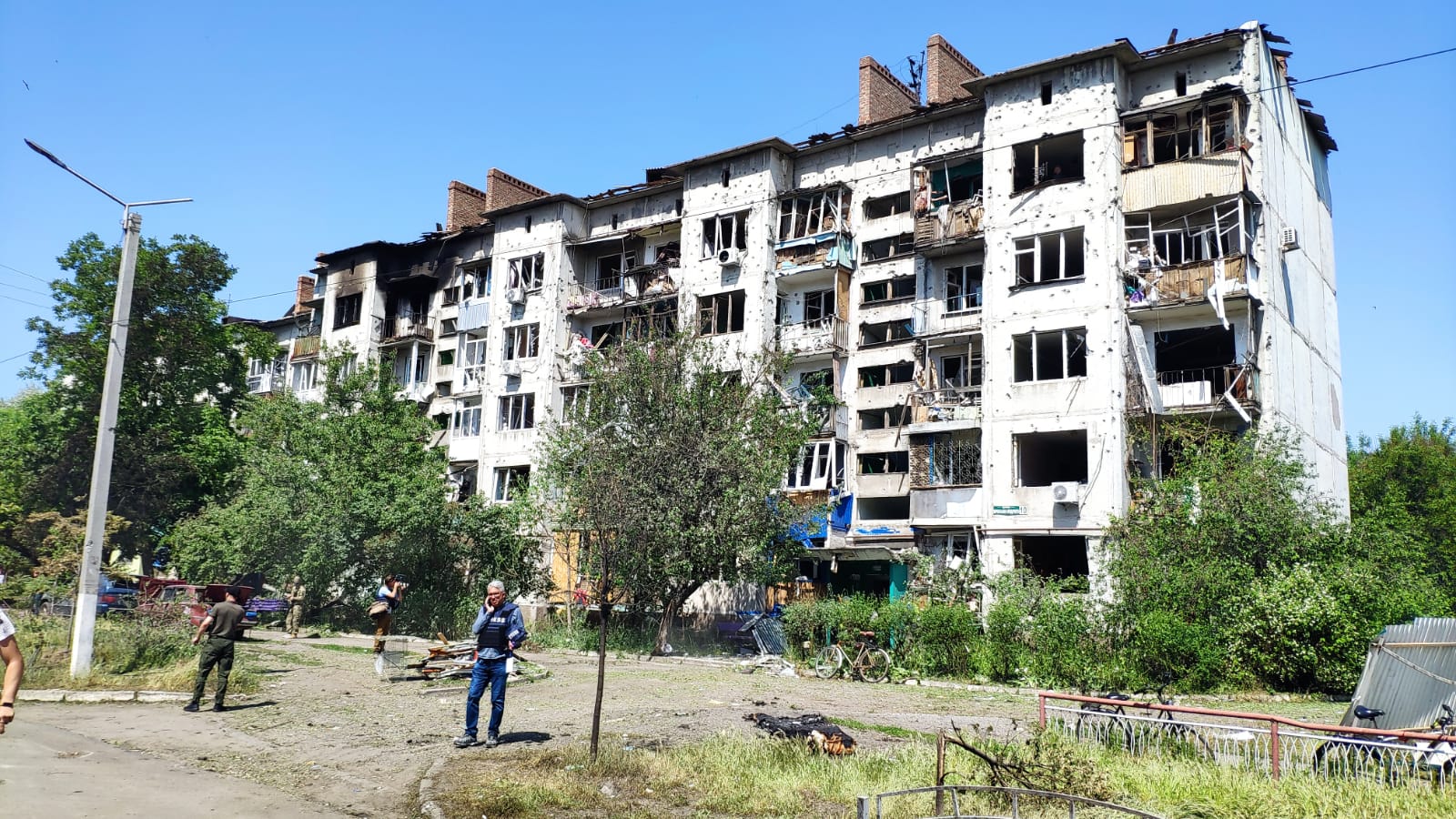‘We don’t know our fate’: Residents in fear of Russian advance as Putin’s missiles kill civilians
Kim Sengupta finds a city targeted by Russian missiles as Putin sets sights on eastern Ukraine


Your support helps us to tell the story
From reproductive rights to climate change to Big Tech, The Independent is on the ground when the story is developing. Whether it's investigating the financials of Elon Musk's pro-Trump PAC or producing our latest documentary, 'The A Word', which shines a light on the American women fighting for reproductive rights, we know how important it is to parse out the facts from the messaging.
At such a critical moment in US history, we need reporters on the ground. Your donation allows us to keep sending journalists to speak to both sides of the story.
The Independent is trusted by Americans across the entire political spectrum. And unlike many other quality news outlets, we choose not to lock Americans out of our reporting and analysis with paywalls. We believe quality journalism should be available to everyone, paid for by those who can afford it.
Your support makes all the difference.The missiles hit the apartment block in the early hours, destroying part of the building and a school next door, charring parked cars and tearing down trees.
Alexander Levchenko, 43, was burned alive in his fifth floor home, after all attempts to rescue him failed. Two others were killed – a 70-year-old woman and a soldier. Two more are missing, likely to be dead, say residents. Eight were injured, three of them seriously.
Groups of residents huddled around the site on Yaroslava Mudroho Street to speak of their concern. There has been foreboding about what may happen here in Slovyansk as Russian forces draw closer; they have already taken effective control of the town of Lyman, bringing their artillery and short-range missiles within striking range of this city.
Slovyansk is of symbolic significance as the place where the separatist insurrection that led to the 2014 war began. It is also now of great strategic importance for Vladimir Putin’s forces in their aim of capturing eastern Ukraine.
On another front, Russian troops are engaged in bitter fighting for Sievierodonetsk and Lisichansk; capturing those cities would give Moscow control over the Luhansk region and offer another avenue into the Donbas.
Ukrainian forces have been severely outgunned on both lines of combat in the east, suffering terrible losses. President Volodymyr Zelensky has declared that Russia “wants to destroy the Donbas” and that its campaign is taking an appalling toll of lives among civilians and the military with up to 100 soldiers being killed every day. The number of injured is not known, but, on battlefield average, three times more fighters are wounded rather than killed.

Supplies of western weapons, say Ukrainians, are not arriving anywhere near fast enough. The United States has announced it will send long-range multiple-rocket systems (MLRS) to Ukraine, although President Biden has stipulated that systems capable of striking Russia will not be among them amid fears of bringing Nato into direct conflict with the Kremlin.
For residents of the blasted buildings in Slovyansk, the future is full of uncertainty and apprehension.
“The Russians are there and we think these attacks will continue, there will be more people killed,” said Elena, 59. “It is very sad to think what happened to poor Alexander. He was a nice man. It is such a terrible way to die, by fire, at his own home.”
Elena, who has been living in the apartments for over 10 years, was born in Russia. “Both my parents are Russian. But I am happy here in Ukraine and I do not see any justification in what Vladmir Putin is doing. He is saying he wants to liberate us, but we don’t want this kind of liberation,” she wanted to stress. “I have a daughter living in [the separatist Donetsk Peoples Republic] and she is told all this propaganda, and she believes it, she talks of this liberation.
We have built a good city since then. I can see it getting destroyed now: for what? This place is not going to be safe
“We had all that fighting in 2014. We have built a good city since then. I can see it getting destroyed now: for what? This place is not going to be safe, I will speak to my husband and we will have to decide what to do.”
At the age of 89, Lydia Nikoleyeva says she has no choice but to stay. “Where am I meant to go? I am ill, I have liver and heart trouble, the tablets I had to take ran out a month ago, no one can get me anymore here. I cannot travel, so I’ll just wait here and see what happens, if the Russians come here”, she says.
Some of those evacuated from Slovyansk have returned, finding it difficult financially and socially to settle elsewhere. Houses in the suburbs seem empty, only for residents to suddenly emerge from their basements. These areas have suffered from artillery and air strikes, and underground seems the safest option.
The deputy mayor of Slovyansk, Yuri Pidhisnyi, says the administration is doing what it can to cope with no gas, restricted water supply and the closure of most food stores. He maintained that Ukrainian forces will successfully defend Slovyansk, but was also convinced that the Russians will try to capture the city.
“They have got part control of Lyman and they are attacking the villages between there and this place,” he says. “This is the city where the terrorists began their operations in 2014. We managed to throw them out of here, but we had eight years of war after that. Now they want to get it back.”
In April 2014, separatists – reportedly augmented by Russian Special Forces – took over the municipal building, the police headquarters and the offices of SBU, the intelligence service. Ukrainian forces experienced one of their biggest losses at the time when a military helicopter carrying 14 personnel, including General Serhiy Kulchytsky of the National Guard, was shot down.

Now, military and security officials speak of the threat of a dual attack into the Donbas from Luhansk, if Sievierodonetsk and Lisichansk are taken, and a thrust from the direction of Lyman. Chechen fighters are said to be engaged on both fronts having been redeployed from Mariupol after the Russians finally overcame resistance there: another sign of the Kremlin concentrating forces here.
Sergei Lavrov, the Russian foreign minister, claims his country now holds the momentum in the conflict and aims to push the Ukrainian army out of both the Donetsk and Luhansk regions.
Major Andriy Eremenko, part of a volunteer unit that has been in combat near Lyman, describes relentless artillery assaults by Russians on villages to force a path to Slovyansk and Kramatorsk.
“They have been firing at Sviatohirsk and Bohorodychne,” he counts on fingers of his hand. “They also tried for Ozerne and Dibrova, these are small places, but the aim is to carry out an offensive on Slovyansk. They have got agents in place in both Slovyansk and Kramatorsk who are trying to help an occupation. They are a danger, our security services are dealing with them.”
There are certainly some residents of Slovyansk whose loyalties appear to be mixed. On the street, four women argue about culpability for the conflict. “Putin is responsible for this mess, he is destroying our country”, says one. “If Ukraine had been willing to talk, this would not have happened, they brought it on themselves,” says another.
Tending her garden across the road, Vera, 70, speaks of the loneliness of being by herself at a time of war. “I hope to live a little longer, I don’t want to die alone, but maybe that’s what will happen, we don’t know our fate”, she says. “But I hope I’ll be spared and our people will be spared.”
Join our commenting forum
Join thought-provoking conversations, follow other Independent readers and see their replies
Comments